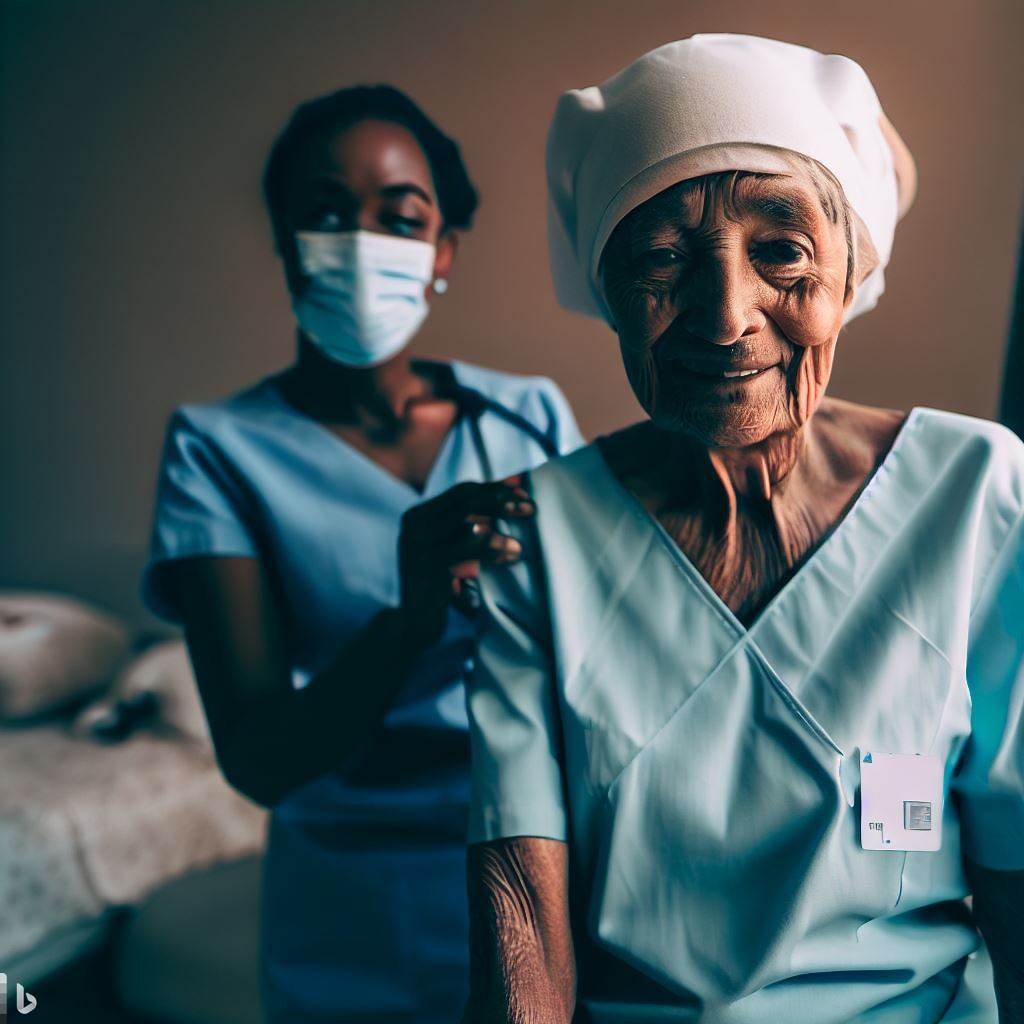Introduction
A day in the life of a Nigerian pediatrician is filled with challenges and rewards. Pediatricians play a crucial role in the healthcare system, ensuring the health and well-being of children.
Pediatricians are essential in providing specialized care for infants, children, and adolescents. They diagnose and treat a variety of illnesses and monitor the growth and development of children.
In addition to providing medical care, pediatricians also educate parents and caregivers about preventive measures and promote healthy lifestyles for children.
Pediatricians work in hospitals, clinics, and private practices. Their day begins early with rounds in the hospital, checking on patients and reviewing medical charts.
They conduct physical examinations, order laboratory tests, and interpret results to make accurate diagnoses. Pediatricians often collaborate with other specialists to provide comprehensive care for their young patients.
Throughout the day, pediatricians see a diverse range of patients, from newborns to teenagers. They listen attentively to their patients and their parents, addressing concerns and answering questions.
Pediatricians provide vaccinations and administer medications as appropriate. They closely monitor the growth and development of children, ensuring they reach important milestones.
A day in the life of a Nigerian pediatrician is demanding but highly rewarding. They have the privilege of making a positive impact on the lives of children, promoting their health and well-being.
In short, pediatricians in Nigeria play a crucial role in the healthcare system, ensuring the health and development of children. Their work involves diagnosing and treating illnesses, educating parents, and providing preventive care.
Despite the challenges, being a pediatrician is a fulfilling profession that allows them to make a difference in the lives of young patients.
Education and Training
Overview of the educational requirements for becoming a pediatrician in Nigeria
- Obtaining a bachelor’s degree in medicine from a recognized Nigerian university.
- Completing a mandatory one-year medical internship.
- Enrolling in and completing a five-year residency program in pediatrics.
- Passing the National Postgraduate Medical College of Nigeria (NPMCN) examination to become a certified pediatrician.
Discuss the medical school curriculum and residency program for pediatricians
Aspiring pediatricians in Nigeria must go through a rigorous educational journey in medical school and during their residency program:
- The medical school curriculum includes pre-clinical and clinical phases.
- Preclinical phase: Students study basic medical sciences such as anatomy, physiology, and biochemistry.
- Clinical phase: Students undergo clinical rotations, including pediatrics, where they gain practical experience.
- After medical school, pediatricians must undertake a five-year residency program.
- During the residency, they receive specialized training in pediatric medicine.
- They rotate through various departments, including neonatology, pediatric cardiology, and pediatric emergency medicine.
- The program offers hands-on experience, and residents are supervised by experienced pediatricians.
Highlight the challenges and rewards of the educational journey in this field
The path to becoming a pediatrician in Nigeria is demanding, but it brings immense personal and professional rewards:
Challenges
- Medical school requires intense studying and dedication to master the vast amount of knowledge.
- The long hours of residency can be physically and mentally exhausting.
- Balancing work and personal life can be challenging due to the demanding nature of the profession.
Rewards
- Being able to make a difference in the lives of children and families.
- Witnessing the joy of seeing a sick child recover and thrive.
- Building lasting relationships with patients and their families.
- Continual professional growth through learning and keeping up with advancements in pediatric medicine.
In essence, becoming a pediatrician in Nigeria requires dedication, years of education, and training. The curriculum and residency program provide aspiring pediatricians with the necessary knowledge and experience to excel in the field.
While the educational journey poses challenges, the rewards of making a positive impact on children’s health and well-being make it all worthwhile.
Read: Combatting Common Misconceptions about Doctors in Nigeria.
Morning Routine: A Day in the Life of a Nigerian Pediatrician
As a Nigerian pediatrician, my morning routine is crucial in ensuring the well-being and health of my young patients. Starting the day with a clear plan and understanding of their medical records is essential.
Reviewing patients’ medical records allows me to stay updated on their current conditions and any changes that might have occurred. This helps me make informed decisions for their treatment and care.
Preparing for the day involves organizing the necessary equipment and resources needed for my daily tasks. This includes ensuring the availability of medical supplies, medications, and specialized tools required for pediatric examinations.
Morning meetings are a regular part of our routine, where we discuss and collaborate on the day’s schedule and patient appointments.
It provides us with an opportunity to share updates, coordinate care plans, and address any concerns or challenges that may arise.
Staying updated with medical research and literature is of utmost importance. Pediatric medicine is constantly evolving, and keeping abreast of the latest advancements and breakthroughs ensures that I provide the best possible care to my patients.
I typically spend some time in the morning reading medical journals, attending webinars, and participating in online forums to enhance my knowledge and expertise. This helps me stay informed about new treatment options, medications, and diagnostic procedures.
Additionally, I prioritize continuing education and often attend conferences and workshops to stay updated on the latest developments and network with other healthcare professionals in my field.
A critical aspect of my morning routine is ensuring proper communication with parents or guardians of my patients.
I schedule appointments to discuss treatment plans, address concerns, and provide education on preventive care measures.
Read: The Doctor-Patient Relationship: A Nigerian Context
Patient Consultations
In the busy life of a Nigerian pediatrician, patient consultations take up a significant part of the day. It is a crucial process that involves not only examining the child but also consulting with their parents or guardians.
The aim is to provide the best possible care and support for each patient.
The Process
- Upon arrival at the clinic, parents and children are warmly greeted by the pediatrician and the staff.
- Patients are then called in one by one, starting with those who have scheduled appointments.
- The pediatrician diligently listens to the concerns and symptoms shared by the parent or guardian.
- Next, a thorough physical examination is conducted to assess the overall health of the child.
- The pediatrician may need to order additional tests or screenings to aid in making an accurate diagnosis.
- Once the examination and necessary tests are complete, the pediatrician discusses the findings with the parent or guardian.
- A treatment plan is then created, which may include medications, lifestyle changes, or referrals to specialists, if required.
- The pediatrician takes the time to answer any questions or doubts the parents or guardians may have.
- Follow-up appointments are scheduled to monitor the progress of the child’s condition and adjust treatments if necessary.
Wide Range of Cases
Being a pediatrician exposes professionals to a diverse range of cases, from routine check-ups to treating various illnesses.
Pediatricians encounter acute and chronic conditions, and their expertise extends to both physical and mental health issues.
- Routine Check-ups: Pediatricians perform regular check-ups to monitor growth and development, administer vaccinations, and ensure overall well-being.
- Treatment of Illnesses: Pediatricians commonly see children suffering from respiratory infections, gastrointestinal problems, skin issues, and fevers.
- Chronic Conditions: Managing chronic ailments like asthma, diabetes, epilepsy, and allergies is an essential part of a pediatrician’s responsibilities.
- Developmental Disorders: Supporting children with developmental delays, autism spectrum disorders, and intellectual disabilities is crucial.
- Emotional and Behavioral Issues: Pediatricians play a vital role in identifying and addressing mental health concerns such as anxiety, depression, and ADHD.
Building Rapport
Building a rapport with patients and their families is a fundamental aspect of pediatric care.
- Establishing Trust: By actively listening, showing empathy, and being approachable, pediatricians gain the trust of both parents and children.
- Effective Communication: Clear and compassionate communication helps pediatricians explain medical jargon, treatment plans, and address concerns.
- Supporting Parents: Pediatricians educate and guide parents on various aspects of child care, including nutrition, hygiene, and safety.
- Empowering Children: By engaging with children and making them feel comfortable, pediatricians create an environment for open communication.
- Long-Term Relationships: Building lasting relationships with families allows pediatricians to provide appropriate care throughout a child’s development.
Generally, patient consultations are the backbone of a Nigerian pediatrician’s day. From listening to concerns, diagnosing illnesses, and formulating treatment plans to building relationships, pediatricians play a vital role in the lives of children and their families.
Read: Trends in Telemedicine: The Future for Nigerian Doctors

Medical Procedures and Treatments
Nigerian pediatricians perform a variety of medical procedures and treatments to ensure the well-being of their young patients.
Administration of Vaccines
- One crucial aspect of a pediatrician’s role is providing immunizations to protect children from diseases.
- Pediatricians follow the vaccination schedule, ensuring all required vaccines are administered at the appropriate ages.
- They explain the importance of vaccines to parents and address any concerns or misconceptions they may have.
Diagnosing Illnesses
- Pediatricians employ various diagnostic techniques to identify and treat illnesses in children.
- They gather medical histories, conduct physical examinations, and order laboratory tests to determine the cause of symptoms.
- Using their expertise, they interpret test results and provide accurate diagnoses.
Providing Appropriate Medications
- Once a diagnosis is made, pediatricians prescribe suitable medications and develop treatment plans.
- They take into consideration the child’s age, weight, and medical history to ensure the right dosage and medication.
- Pediatricians educate parents about the medications, including potential side effects and proper administration methods.
Challenges and Complexities
Treating pediatric patients comes with unique challenges and complexities for Nigerian pediatricians.
Communicating with Young Patients
- Pediatricians must have excellent communication skills to interact effectively with children.
- They use age-appropriate language and tools to explain medical procedures and treatments to young patients.
- Gaining a child’s trust is crucial to ensure their cooperation and reduce anxiety during medical interventions.
Dealing with Parental Anxiety
- Parents often have concerns and anxieties about their child’s health, making communication and reassurance vital.
- Pediatricians address parental worries by explaining procedures, treatments, and potential outcomes in detail.
- They provide support and guidance to help parents make informed decisions regarding their child’s healthcare.
Pediatric-Specific Medical Knowledge
- Diagnosing and treating children requires specialized knowledge due to their unique physiological and developmental characteristics.
- Pediatricians stay up-to-date with the latest medical research and guidelines for pediatric care.
- They continuously expand their knowledge to provide the best possible care for their young patients.
Emotional Toll
- Working with sick children can be emotionally challenging for pediatricians.
- They witness the pain and suffering experienced by their young patients and their families.
- Pediatricians must find a balance between empathy and maintaining their professional composure.
Nigerian pediatricians play a vital role in the healthcare of children, performing medical procedures, providing treatments, and addressing numerous challenges along the way.
Through their expertise and dedication, they contribute to the well-being and future of Nigeria’s youngest generation.
Read: Healthcare Reforms: A New Era for Doctors in Nigeria
Collaboration with Healthcare Team
- Collaboration with other healthcare professionals is crucial for a Nigerian pediatrician.
- Working together as a team ensures comprehensive and holistic care for pediatric patients.
- Nurses play a vital role in providing direct care and monitoring the well-being of young patients.
- Specialists, such as pediatric surgeons or cardiologists, bring their expertise to the table for complex cases.
- Effective communication and coordination among the healthcare team members are essential.
- Regular meetings and discussions help in sharing information and making informed decisions.
- Each healthcare professional contributes their unique skills and knowledge to enhance patient outcomes.
- A pediatrician relies on other doctors for consultations and second opinions, ensuring the best care possible.
- Collaboration encourages a multidisciplinary approach that addresses the physical, emotional, and social needs of children.
- The healthcare team focuses on developing personalized treatment plans for each pediatric patient.
- Coordination between different professionals ensures smooth transitions during various stages of care.
- Open and respectful communication fosters trust, promotes shared decision-making, and reduces errors.
- A Nigerian pediatrician appreciates the expertise and input from other healthcare professionals.
- The team’s collective efforts optimize patient outcomes and enhance the overall healthcare experience.
- The healthcare team works together to provide support to families and educate them about their child’s condition.
- Collaboration helps in identifying potential challenges early and implementing preventive measures.
- By working as a team, the healthcare professionals can improve their understanding of different perspectives and approaches.
- This collaboration leads to continuous learning and professional growth for all members of the healthcare team.
- The team’s collaboration extends beyond the hospital setting and may involve community organizations and resources.
- Together, the healthcare team contributes to the overall well-being and development of pediatric patients.
- The Nigerian pediatrician values the input and involvement of other healthcare professionals in the care of their young patients.
Continuing Medical Education
Commitment to Lifelong Learning
Nigerian pediatricians are dedicated to lifelong learning, constantly seeking ways to improve their knowledge and skills.
They understand the importance of staying updated with advancements in medical knowledge and practices.
Staying Updated with Advancements
Pediatricians actively engage in a variety of activities to keep themselves updated with the latest advancements.
They regularly read medical literature, attend conferences, and participate in workshops to stay at the forefront of their field.
Attending Conferences and Workshops
Nigerian pediatricians realize the significance of attending conferences and workshops. These events provide a platform to learn about cutting-edge research, latest treatments, and advancements in technology.
By attending such gatherings, pediatricians can expand their knowledge and stay updated with current practices.
Participating in Research Activities
Pediatricians in Nigeria actively participate in research activities to enhance their understanding and contribute to the medical field.
They collaborate with other professionals, conduct studies, and analyze data to gain insights into new treatment options and best practices.
Benefits of Continuing Education
Engaging in lifelong learning and continuing education has numerous benefits for Nigerian pediatricians. It allows them to provide the best possible care to their young patients by staying updated with the latest medical advancements.
By continuously improving their knowledge and skills, pediatricians can make informed decisions and offer effective treatments.
Improved Patient Outcomes
Continuing education enables pediatricians to stay up-to-date with the latest evidence-based practices. This, in turn, leads to improved patient outcomes and better overall healthcare for children in Nigeria.
Enhanced Diagnostic Abilities
By participating in continuing education activities, pediatricians enhance their diagnostic abilities. They learn new techniques and approaches that help in accurately identifying and treating various pediatric conditions.
Networking and Collaboration
Conferences and workshops provide pediatricians with opportunities to network and collaborate with other professionals.
This strengthens the pediatric community and fosters a collaborative environment where knowledge and experiences are shared.
Professional Growth and Personal Satisfaction
Continuing education allows Nigerian pediatricians to grow professionally and personally. They gain confidence in their abilities, enhance their credibility, and find personal satisfaction in their continuous development.
Nigerian pediatricians are committed to lifelong learning and continuing education. By attending conferences, workshops, and engaging in research activities, they stay updated with advancements in medical knowledge and practices.
Continuing education not only benefits the pediatricians themselves but also improves patient outcomes and overall healthcare in Nigeria.
Discover More: The Rise of Telepsychology in Nigeria: A Study
Challenges and Rewards
As the sun rises, a Nigerian pediatrician steps into a world of challenges and rewards. Limited resources and high patient loads test their resilience daily.
Emotions run high as they face sick children and difficult diagnoses, but amidst the struggles, there are moments of fulfillment and joy.
Challenges Faced by Nigerian Pediatricians
- Limited Resources: Scarce medical equipment and inadequate facilities pose constant hurdles.
- High Patient Loads: Overwhelming number of patients demands unwavering dedication and efficiency.
- Funding Issues: Financial constraints affect the quality of care and accessibility.
The Emotional Aspects of the Job
- Dealing with Sick Children: Witnessing innocent souls battling illnesses can be heart-wrenching.
- Difficult Diagnoses: Conveying heartbreaking news to parents challenges their emotional strength.
Rewards of the Profession
- Making a Difference: The opportunity to impact children’s lives and shape their futures.
- Witnessing Recovery: Celebrating each little triumph as children overcome illnesses is profoundly gratifying.
In the midst of adversity, Nigerian pediatricians press on, fueled by their passion for healing and hope. The smile of a recovering child erases the exhaustion, making every hardship worthwhile.
Though their journey is arduous, the dedication to their noble cause keeps them going.
Every day, these pediatricians serve as beacons of compassion and care, paving the way for healthier generations.
They may face hurdles unique to their setting, but the desire to touch young lives and create a healthier society remains a driving force.
In a nutshell, the life of a Nigerian pediatrician is a rollercoaster of challenges and rewards. Their determination to navigate limited resources and high patient loads, coupled with the emotional weight of caring for sick children, demonstrates their unyielding dedication.
Yet, the rewards of witnessing a child’s recovery and making a lasting impact make it a gratifying and fulfilling profession.
In the face of adversity, Nigerian pediatricians continue to stand tall as champions of children’s health.
Conclusion
Being a pediatrician in Nigeria is a challenging yet rewarding profession. Throughout this blog post, we have highlighted the key points that portray the life of a Nigerian pediatrician.
Pediatricians play a vital role in improving child healthcare in Nigeria. They are dedicated to providing quality care, diagnosing and treating various medical conditions affecting children, and ensuring their overall well-being.
Their efforts are crucial in addressing the healthcare needs of children, contributing to the reduction of child mortality rates, and building a healthier future for Nigeria.
It is important for readers to appreciate the incredible efforts and dedication of pediatricians in their daily lives. They work long hours, sacrifice personal time, and strive to improve the lives of children.
Next time you encounter a pediatrician in your community, make sure to express gratitude and appreciation for their commitment to child health.
Let us support and encourage pediatricians in their mission to create a healthier and brighter future for Nigerian children.




